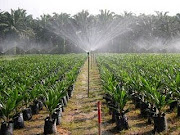
Felda should first restructure before going global
Malaysiakini: Dr Collin Abraham | Jun 29, 09 6:36pm
The announcement that Felda will be setting up a new entity, ‘Global Ventures’ is only to be welcomed as being relevant and meaningful if, as implicitly correctly suggested by Prime Minister Najib Abdul Razak, the forthcoming ‘restructuring’ of Felda ‘pays attention to the needs of settlers’.
This means, in effect, that ‘Global Ventures’ demands the pre-requisite of settlers being involved as stake-holders jointly participating in the organisation and administration of Felda at the highest points of decision-making.
This, in fact, has never been the case, especially as clearly highlighted by the failure to provide ‘listings’ for settlers on the stock exchange, as repeatedly requested by both former prime minister Abdullah Ahmad Badawi and indeed Najib himself.
As regards the other ‘failures’ to develop a viable settler community involving the second/third/and even fourth generations, the record speaks for itself, where settlers even successfully obtained legal remedies in connection with a successful court case of cheating against Felda. Another similar legal case is currently pending.
With the greatest of respect and in humility, I have to reiterate therefore that unless the proposed ‘restructuring’ amounts to the radical transformation of Felda as an institution, the new entity of ‘Global Ventures’ will amount to nothing more than the continuation of the cases of ‘pagar makan padi’/’empire-building’ that have repeatedly been ‘exposed’ in the past.
These are very strong negative assertions and this appeal to Najib, therefore, is to make it possible to re-direct and intervene in these new development projections to ensure that they are in line with the founding ideology of Felda, so spectacularly projected by his late father, Razak.
This is a very serious matter that strikes at the heart of the concept, theory and implications for agricultural-industrial plans and programmes particularly in multi-cultural societies, not only for Malaysia but also for Asia and indeed the rural development scenario in the wider world.
Therefore, it is imperative to emphasise that the assertions being made here are based inter alia, on my experiences as a member of Razak’s 11-man national committee for Gerakan Maju (where incidentally I was the only non-Malay and the youngest officer) at a time when we were very much involved in new thinking and research for Felda.
More recently, as the lead consultant and sole report writer for the UNDP social impact assessment of Felda (2002), I was directly concerned with the kind of questions and issues arising from Najib’s statement that ‘Felda (is) set to grab global opportunities’.
It may be useful to ‘highlight’ some of the main observations in the report that have ‘direct’ implications for meaningfully ‘grabbing the global opportunities’ as mentioned by Najib.
1 The structure for reform
Group Settlement Areas Act 1960, Act 530 (amended 1996)
The promulgation of this amendment made it possible for Felda itself to move directly to develop new land settlements on its own accord, because the government had decided to cease doing this since 1990.
‘The implications of this amendment in the context of the objectives of the original 1960 Act appear to be so ‘reactionary’ as to require another full-scale study and re-evaluation of the social impact of this amendment on Felda’.
This is because while the organisation successfully managed to enhance its oil palm production activities, increasing emphasis in its expansion plans and programmes began to focus on non-agricultural areas centered on ‘empire building’.
Because no attempts were made to get settlers listed on the stock exchange, it meant that the shareholders were limited to Felda management and other professionals, who would be the main beneficiaries of the various new subsidiaries and other ventures initiated in its expansion programme.
2 Future sustainability for diversification.
Felda has brought ‘independent’ title-holding settlers completely under its management. This has generated intractable dependency relationships between the settlers and management rather than enhancing the process of social change through motivation, capacity-building, creativity and entrepreneurship as was the basic and fundamental objective in the original Felda ideology.
Because no attempts were made to involve settlers in the management of the schemes, they ‘have little confidence in decision-making and indeed seem helpless to take control of their lives and to move on. They, therefore, leave it to the management to take over and organise their ‘freed’ land titles as soon as they receive them’.
There is a low-level of diversification of economic activities associated with oil palm production particularly through down-stream/up-stream new products resulting in settlers not being exposed to flexible knowledge-based training.
Therefore the potential of innovative capacity especially among youth is not tapped. As a result Felda has not sustained a strategic role as catalyst in industrialisation and modernisation.
Related Article:
http://malaysiainsider.com/index.php/business/30948-felda-to-seek-listing-soon


No comments:
Post a Comment